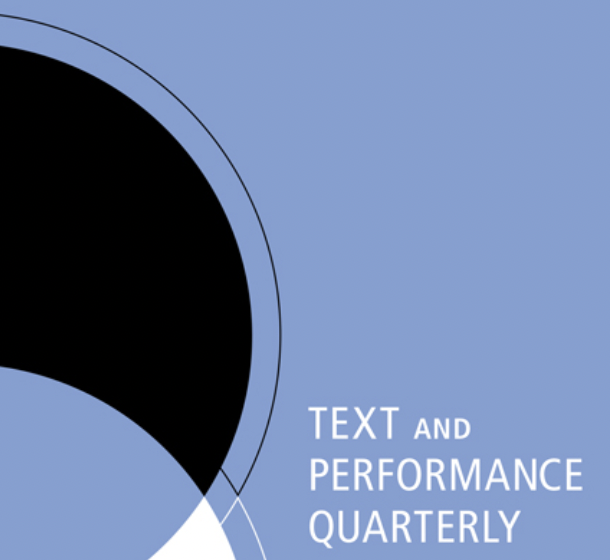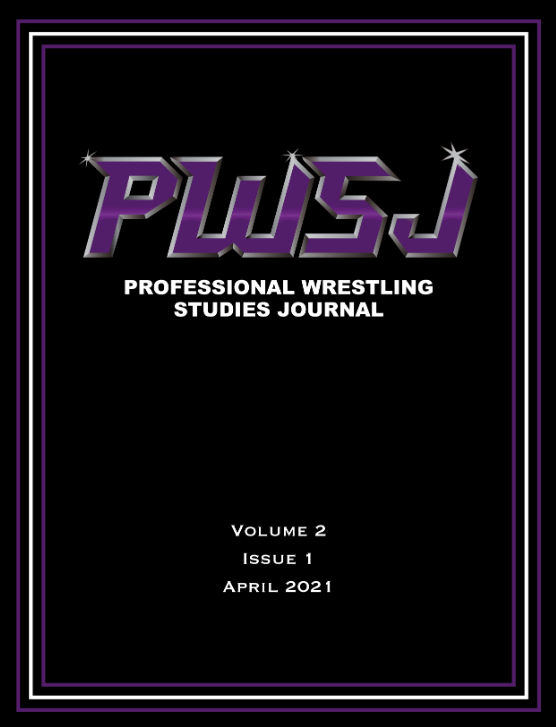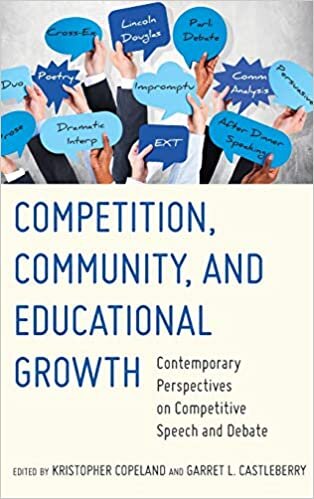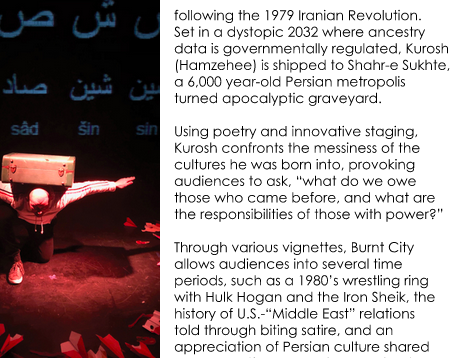
Publications & Scholarship
Published Peer-Reviewed Manuscripts
-

“A terrible beauty is born”: using Yeats to respond to Last Words, November 2021“
Hamzehee, J. (2023).
Text & Performance Quarterly, 2023.In 2021, I attended the first National Communication Association conference since 2019 (before the COVID-19 pandemic began), and I participated in Kirt Shineman’s experimental collaborative performance, Last Words. In response to Shineman’s curation of historic texts in an experimental form, this response reflects on my immersive audience member <-> performer experience, and concludes by using William Butler Yeats’ “Easter 1916” (and other Yeats texts) to craft a poetic reply to the content, form, and 1916/2021 time periods of Last Words.In 2021, I attended the first National Communication Association conference since 2019 (before the COVID-19 pandemic began), and I participated in Kirt Shineman’s experimental collaborative performance, Last Words. In response to Shineman’s curation of historic texts in an experimental form, this response reflects on my immersive audience member <-> performer experience, and concludes by using William Butler Yeats’ “Easter 1916” (and other Yeats texts) to craft a poetic reply to the content, form, and 1916/2021 time periods of Last Words.
-

“Adaptation Unites Us!: A Call for Performance Studies and Forensics Interpretation to Adapt With Each Other.”
Hamzehee, J. (2022).
Text & Performance Quarterly, TBD.I have experience adapting texts and subverting form because of my histories as a student, coach, instructor, scholar, and practitioner in both performance studies and forensics interpretation. I argue practitioners in each area can benefit by adapting with and to the other. This essay urges performance studies to embrace forensics interpretation because of potentials provided through consistent adaptive experimentation opportunities, exposure to texts and audiences, and feedback rooted in critical generosity. Applying a conceptual chiasmus, forensics gains by opening binders to performance theories, methodologies, and developed texts, to the diversity of forms performances take, and to insights experimental performance paradigms offer.
-

"Introduction: Generative Multimodal Storytelling Performance"
Mitchell Schares, E., Hamzehee, J., and Shoemaker, D. (2022).
Liminalities: A Journal of Performance Studies, 18.4.This forum animates generative multimodal storytelling performance to excavate family cultures, genealogical belongings, and the ties that bind us together. The pieces composing the forum (re)present the kaleidoscopic nature of familial and cultural relations and the ways we perform, make, unmake, and heal those relations. The forum shares performances that have existed in numerous iterations: a panel of solo performances exploring family stories at the 2021 National Communication Association, collaborative and digital performances at our various home institutions, and now shared together on a digital platform utilizing expanded modalities. It is our hope that you - the audience - source inspiration from our shape-shifting performances as useful models of scholarly, creative, and familial inquiry.
-

“Khok-e Sattar, Shahr-e Sukhte, and Yogurt Drink: Digitally Adapting Khudnigari with Vignettes from Burnt City: A Dystopian Bilingual One-Persian Show.”
Hamzehee, J. (2022).
Liminalities: A Journal of Performance Studies, 18.4.The digital performance of “Khok-e Sattar, Shahr-e Sukhte, and Yogurt Drink” consists of three vignettes from my full-length autoethnographic performance, Burnt City: A Dystopian Bilingual One-Persian Show. By digitally adapting my khudnigari (autoethnography) and embodying Farglish (Farsi and English), I complicate verbal bilinguality with physicality, liveness with digitization, and show that memory, language, and performance cannot be fully separated. A framing essay is included, providing context for the digital performance khudnigari.
-

“Rehearsing with Imagined Interactions Theory: Exploring Imagined Interactions as Framework for Ensemble and Solo Performance Rehearsals.”
Hamzehee, J. (2022).
National Forensic Journal, 38.1.How should I practice is a common question that comes up while teaching performance and public speaking classes, when directing and performing in productions, and when coaching and competing for forensics squads. This essay provides a rationale for fusing Honeycutt’s imagined interactions theory (2003) with performance rehearsal processes, employing research guiding retroactive and proactive imagined interactions as a template to frame rehearsals that have the purpose of future actor<->spectator engagement. I use my experiences applying imagined interactions to an ensemble performance rehearsal and during a solo performance rehearsal to show the usefulness, limitations, and potentials of this methodological hybridization.
-

“Baton Rouge SLAM!: An Obituary for Summer 2016.”
Hamzehee, J. (2021).
Text & Performance Quarterly, 41.1.This performance script created from a critical performance ethnography focuses on how Eclectic Truth Poetry Slam in Baton Rouge, LA, responded to a crisis-filled summer 2016. Summer 2016: political tensions were at a boiling point in a parish flooded with water and lost lives. Fall 2016: over half of all Eclectic Truth slam poems performed by local poets referenced that summer’s successive tragedies. With permission from local poets, I collected ethnographic fieldwork, theatricalized their slam poems, and adapted our co-created interviews to script Baton Rouge SLAM!: An Obituary for Summer 2016 for Baton Rouge audiences and beyond.
-

“Eclectic Truth Poetry Slam To Baton Rouge SLAM! An Obituary For Summer 2016: A Recording of Critical Performance Ethnography.”
Hamzehee, J. (2021).
Text & Performance Quarterly, 41.1.This account of critical performance ethnography focuses on how Eclectic Truth Poetry Slam in Baton Rouge, LA, responded to a crisis-filled summer 2016. Summer 2016: political tensions were at a boiling point in a parish flooded with water and lost lives. Fall 2016: over half of all Eclectic Truth slam poems performed by local poets referenced that summer’s successive tragedies. With permission from local poets, I collected ethnographic fieldwork, theatricalized their slam poems, and adapted our co-created interviews to script Baton Rouge SLAM!: An Obituary for Summer 2016 for Baton Rouge audiences and beyond.
-

“Legdropping the Iron Sheikh: An AutoEthnographic Performance Selection from Burnt City: A Dystopian Bilingual One-Persian Show.”
Hamzehee, J. (2021).
Professional Wrestling Studies Journal, 2.1.Legdropping the Iron Sheikh is an autoethnographic performance selection from Burnt City: A Dystopian Bilingual One-Persian Show. Burnt City (or شهر سوخته) is a solo performance about United States-Iran relations. This performance uses poetry, humor, video, and the Farsi language to excavate how domestic abuse at home is congruous to violence inflicted by governments on citizens. In Legdropping the Iron Sheikh, the fifth scene from the production, Hamzehee juxtaposes parallels between his father’s U.S. arrival during the 1979 Iranian Revolution with the Iron Sheik’s 1980s’ battles with the All-American Hulk Hogan. This creative essay, script, and performance provides insight into this match as a critique of 1980’s U.S.-Iran relations, as well as Hamzehee’s relationship with his Persian father, arguing that the impacts of domestic abuse felt at home have parallels to those inflicted by homelands.
-

“Your Time is Running Out: After the Marjory Stoneman Douglas High School Mass Shooting, the NRA Aims for Enemyship, and a Survivor Responds."
Hamzehee, J. (2021)
Florida Communication Journal, 49.2.
In 2018, at Marjory Stoneman Douglas High School in Parkland, FL, 16 students and one adult were killed and 17 wounded by bullets from a former student. 16 days after the Parkland shooting, the NRA responded to student/survivor outrage with a package of online advertisements. This essay focuses on the NRA release of the Dana Loesche-led video, “Your Time is Running Out,” and student/survivor Sarah Chadwick’s pointed parody video echoing the NRA’s rhetorical devices. Examining these texts side-by-side unearths how the NRA strategically harnesses Engels’ enemyship in order to frame and control perception of gun violence and gun reform in the United States. -

“Surviving the Solo Show Wilderness: Exploring One-Person Performance Processes through the Metaphor of Wilderness Survival.”
Hamzehee, J.., Baldwin, A., Collins, C., Gamboa, E., Garcia, N., Scott, J., and Stephenson Shaffer, T. (2020).
Liminalities: A Journal of Performance Studies, 16.4.At the 2019 National Communication Association conference in Baltimore, MD, seven performance studies practitioners came together to create a solo performance survival guide. The theme for the 105th annual convention was "Communication for Survival." Our panel was titled, "Surviving the Solo Show Wilderness: Exploring One-Person Performance Processes through the Metaphor of Wilderness Survival." We hoped dividing the solo show process into seven malleable steps might help a performer's journey become less about surviving and more about thriving. At the time of our submission, our academic positions ranged from undergraduate student to full professor, and we have each guided, taken, and/or are currently undergoing the one-person expedition. We present this multi-vocal and multi-modal artifact as both a souvenir of that conference panel and as a solo production starter-kit for those traversing and preparing for the wonderful wilderness that is one-person performance.
-

“Abbreviating Boal at the Louisiana Old State Capitol Museum: Using Image Theatre.”
McDonald, B., Hamzehee, J., Bennett, N., and Smith, M. (2020).
Pedagogy and Theatre of the Oppressed Journal, 5.1.This article describes the execution of and reflections of a Theatre of the Oppressed workshop offered in 2017 to middle and high school groups visiting the Louisiana Old State Capitol Museum on half-day field trips. The workshops accompanied The Power of Children: Making a Difference exhibit, which features the stories and struggles of Ruby Bridges, Ryan White, and Anne Frank. Despite initial plans for an hour-long session, the workshop designed to connect youth participant experiences to the stories of the children featured in the exhibit was cut to only fifteen minutes. Our group of four facilitators discusses ways we modified Augusto Boal’s Image Theatre practices, the difficulties we faced leading short sessions in the setting of a school field trip, and our worries about maintaining emotional safety as youth tackled themes of power, powerlessness, and policing.
Published Book Chapters and Book Reviews
-

“¡Presente! The Politics of Presence by Diana Taylor.”
Hamzehee, J. (2021).
Text and Performance Quarterly, 41.4. -

“Slam!: The Most Successful Poetry Movement of the Twenty-Second Century.”
Hamzehee, J. (2021).
Twentieth Century and Contemporary Literature in Context, edited by Linda De Roche. ABC-CLIO Press. -

“The Road to Critical Consciousness is Paved with Smelly Socks: Travel Time as a Site of Humanization in Forensics.”
Rudick, K., Farias, S., and Hamzehee, J. (2018).
Competition, Community, and Educational Growth: Contemporary Perspectives on Competitive Speech and Debate, edited by Kristopher Copeland. Cambridge Scholars Publishing. -

“Review of Palestinian Theatre in the West: Our Human Faces by Gabriel Varghese (Palgrave MacMillan).“
Hamzehee, J. (2020).
Lateral: Journal of the Cultural Studies Association, 9.2.
Recent Creative Publications
-

“Anagrams, Space, and Laura Jane Grace (Dreaming with Nora).”
Hamzehee, J. (2022)
Mag Pie Magazine #17: The Dream Issue, edited: Emily Stowe, Mag Pie Press. -

“Bigfoot Lives!”
Hamzehee, J. (2020).
Major Threat: Punk Rock Academia #2, Major Threat Press. -

“Burnt City Battles U.S.-Iran Relations with Bi-Racial Humor and Bilingual Poetry.”
Hamzehee, J. (2020).
Mag Pie Magazine #8: Connection, edited by Emily Stowe. Mag Pie Press. -

“Worn: A Cornell Box.”
Hamzehee, J. (2020).
Mag Pie Magazine #9: The Craft Issue, Mag Pie Press.
Manuscripts Submitted (Under Revisions/Review)
-

Humanizing Statistics -> Alienation Installations: Immersive Performance during COVID-19.
Hamzehee, J.
-

From Final Rounds to Final Defenses: Applying Community College Forensics Lessons to Our Doctoral Dissertation Processes.”
Hamzehee, J., Hsieh, M, and Stevenson, J.

Book for 2023-2025
Full shows, solo events, workshops, speech coaching, lectures, performance camps…